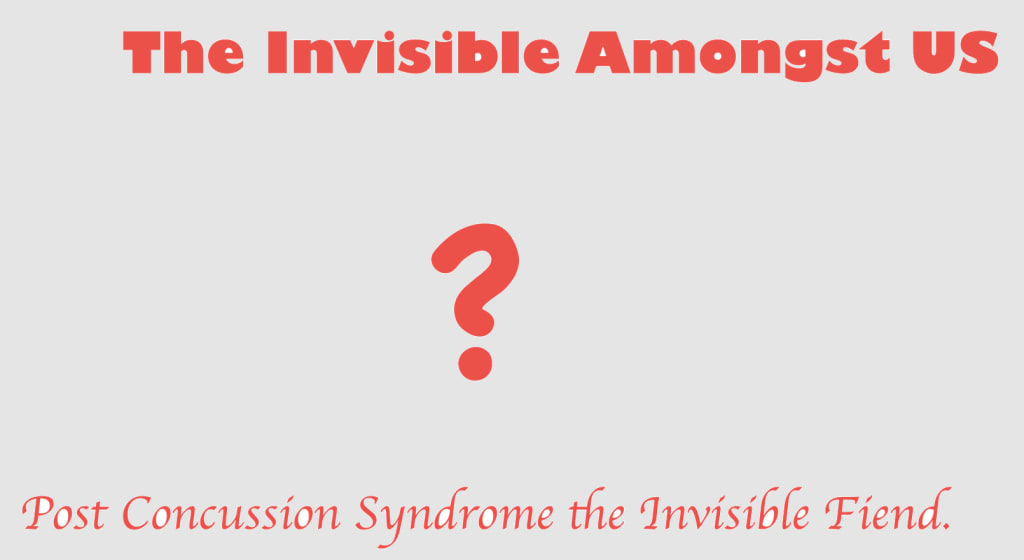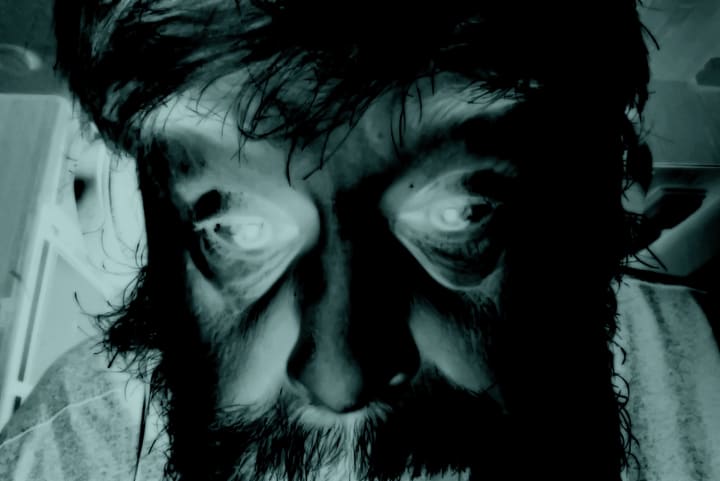The Invisble amongst us
Post Concussion Syndrome the Invisible Fiend.

"In January 2021, I was driving to see my mother at a local hospital. Traffic halted suddenly, and I was so happy I did not strike the vehicle in front of me. I gazed up in my rear-view mirror just as the vehicle behind struck my little sub-compact vehicle. "
(Section from my August 2021 Article; please read for background on this article.)
Since I wrote that article, a lot has happened and not happened. In late June 2021, my brother died, my mother died in late October, and my father died in the first week of November 2021. Additionally, several others I was close to, people I respected, loved, and cared for, also died in 2021 and 2022.
Some of my injuries have improved in various ways over time. My concussion problems are still with me; I have had some excellent days, and I started to believe I was on the road to recovery. I accomplish a great deal these days and sometimes have two or three days like this. I began to learn when my body was about to crash. My vision would start to have little black lines appearing, my ears buzzing, and soon after, my brain would begin to fog.
Unlike someone on crutches or with bandages, my pain or suffering is not visible. Like someone on crutches or with other visible injuries, I will eventually collapse in bed or a dark place for some time. Sometimes, the worst part is my memory slows down, and I will repeat myself, forgetting where I was going or had been. Once the migraine grows intense, the nice, easy-going guy who worked with teenagers, people with addiction issues and those in halfway houses disappears.
I have tried wearing dark glasses in areas with bright lighting as I have become quite sensitive to lighting. This has led to strange looks and comments from others at least once questioned by a guard at a storefront door.
What hurts more than the physical pain, comments, or actions of strangers are the comments stated by colleagues or people I consider friends. "It was only a Fender Bender." "He is retarded" "I do not see any injuries." "It was not like you flew through the windshield or played sports
Sometimes, people write or say words without considering how they may affect others. I know I have done it in the past, but at some point, everyone has said something they wish they had spoken or written differently.
"Hurtful words lacerate the heart. Although it may heal over time, scars will never completely disappear." ― Anoir Ou-chad, The Alien.
I hope it is through ignorance or a lack of understanding that people sometimes say gruel or hurtful words to those with invisible injuries.
.
CONCUSSION TRUTHS
"A mild traumatic brain injury is known as a concussion. It could happen due to a fall or auto accident, while playing contact sports, or from violent shaking and movement of the head or body." - Mayo Clinic.
Despite having an over-the-shoulder seat belt, the head can still violently shake in an auto accident. You do not have to black out or pass out to experience this.
"In most people, symptoms appear within the first 7 to 10 days and go away within three months. But sometimes, they can last for a year or more" -Mayo Clinic.
Headaches, dizziness, memory problems, blurred vision, and ear ringing are all part of the hidden struggles. According to numerous researchers and specialists, as many as thirty percent of individuals experience Post-Concussion Syndrome following a concussion. This condition can persist for weeks or months, and for some, it may become a lifelong challenge.
Employers, Trade Unions, Family & Friends something to consider.
The National Library of Medicine lists a study and article on Post-Concussion Syndrome and how to help people recover. The research was performed at U.B.C.
Article from July 2022
https://www.ncbi.nlm.nih.gov/pmc/articles/PMC9266414/
This study looked closely at what helps and hinders people recovering from concussions and what may hinder a return to the workplace. They talked to adults who had concussions (workers) and professionals from workplaces and healthcare. They did interviews and group discussions with 31 workers and 16 workplace professionals in British Columbia. They found that things like getting the right treatment, support from friends and family, and changes at work or in lifestyle can help with recovery and returning to work. Both groups suggested solutions for the barriers, like educating people about concussions and returning to work, having standard guidelines for recovery, changing how people think about concussions, providing support for mental health, and understanding that each concussion is different. These findings can help professionals in workplaces, healthcare, and other related fields improve how they help people recover from concussions and create a positive experience returning to work.
What can employers, unions, human resource professionals, religious leaders, and, yes, politicians do to help?
"But what’s often missing from the media’s discussion of the topic is a recognition that the concussion problem is not merely a health issue: it’s also a social issue." - Theconversation.com Jan 16th,2015
In the province of British Columbia, go to this website to learn.
https://cattonline.com/workers-workplaces/
“The Concussion Awareness Training Tool for Workers and Workplaces (CATT WW) launched in 2019.
In Canada
https://www.pshsa.ca/hazards-resources/concussion-in-the-workplace
In U.K.
https://www.nhs.uk/conditions/head-injury-and-concussion/
In Australia
https://www.betterhealth.vic.gov.au/health/conditionsandtreatments/head-injuries-and-concussion
Please take a moment to delve into some research, and perhaps you'll uncover ways to support that employee, co-worker, friend or family member dealing with post-concussion syndrome, elevating yourself into an even more compassionate individual than you already are.
Final Thought
People with Post Concussion Syndrome, which is also called Persistent Post-Concussive Symptoms, often struggle in ways that aren't obvious to others. They feel that they are fighting a silent battle, often alone. The National Library of Medicine website says that someone dealing with PCS is three times more likely to try to take their own life.
The website "Psychiatry online" wrote,"A growing area of interest related to postconcussive-TBI symptoms includes changes in aggressive behaviour," in both verbal and physical forms, after head injury.
(Roy D, Vaishnavi S, Han D, et al.: Correlates and prevalence of aggression at six months and one year after first-time traumatic brain injury. J Neuropsychiatry Clin Neurosci 2017; 29:334–342)

Authors Notes
Yes, I've been diagnosed with P.C.S. (Post-Concussion Syndrome), and I've endured hurtful remarks, unfounded accusations, excruciating pain, and overwhelming isolation. I hope for a future where society is more compassionate and attentive to the struggles of those with invisible injuries.
Please comment, subscribe and do anything you feel led to.
Thank you
Bruce Curle
About the Creator
Bruce Curle `
A Fifty something male that enjoys writing short stories, scripts and poetry. I have had many different types of work over my lifetime and consider myself fairly open minded and able to speak on many topics.
Reader insights
Outstanding
Excellent work. Looking forward to reading more!
Top insight
Heartfelt and relatable
The story invoked strong personal emotions







Comments (6)
Congratulations it's great.
Congrats on your Top Story!
Forgot to congratulate you on your Top Story! 🎉🎉
❣️Such a valid point you have made that it is also a social issue. Good luck with the issue; I’m sorry people are ignorant and do or say hurtful things. 😼
This is very informative and I appreciate you for baring yourself and your struggles to give awareness to this impairment. It's nothing short of admirable.
Thank you for sharing your story. Some of my own and my husband's disabilities are invisible to the eye, and we get faced with discrimination too. I feel for what you are going through, but never let those horrid actions stop you from being you. I enjoyed reading your work, and I am glad that you have spoken out about your condition.